-
 Bitcoin
Bitcoin $117500
2.15% -
 Ethereum
Ethereum $3911
6.19% -
 XRP
XRP $3.316
10.79% -
 Tether USDt
Tether USDt $1.000
0.01% -
 BNB
BNB $787.2
2.24% -
 Solana
Solana $175.2
4.15% -
 USDC
USDC $0.9999
0.00% -
 Dogecoin
Dogecoin $0.2225
8.40% -
 TRON
TRON $0.3383
0.28% -
 Cardano
Cardano $0.7868
6.02% -
 Stellar
Stellar $0.4382
9.34% -
 Hyperliquid
Hyperliquid $40.92
7.56% -
 Sui
Sui $3.764
7.63% -
 Chainlink
Chainlink $18.48
10.66% -
 Bitcoin Cash
Bitcoin Cash $582.1
1.88% -
 Hedera
Hedera $0.2601
6.30% -
 Avalanche
Avalanche $23.33
4.94% -
 Ethena USDe
Ethena USDe $1.001
0.02% -
 Litecoin
Litecoin $122.3
2.04% -
 UNUS SED LEO
UNUS SED LEO $8.969
-0.27% -
 Toncoin
Toncoin $3.339
0.86% -
 Shiba Inu
Shiba Inu $0.00001287
4.30% -
 Uniswap
Uniswap $10.43
7.38% -
 Polkadot
Polkadot $3.861
5.08% -
 Dai
Dai $1.000
0.02% -
 Bitget Token
Bitget Token $4.513
3.41% -
 Monero
Monero $267.7
-6.18% -
 Cronos
Cronos $0.1499
4.14% -
 Pepe
Pepe $0.00001110
5.15% -
 Aave
Aave $284.9
8.28%
What is the use of Bitcoin contract lock-up? Can locking positions reduce risk?
Bitcoin contract lock-up can reduce risk by locking in positions, but traders must consider opportunity costs and market volatility when using this strategy.
May 03, 2025 at 10:15 am
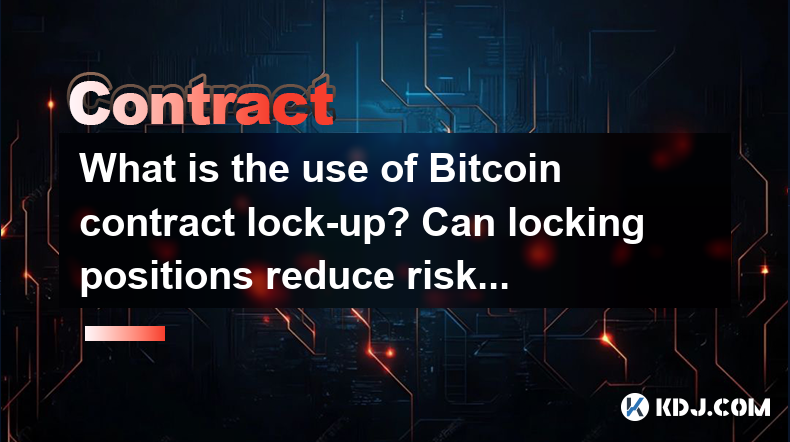
What is the Use of Bitcoin Contract Lock-Up? Can Locking Positions Reduce Risk?
Bitcoin contract lock-up refers to a strategy where traders or investors lock in their positions in Bitcoin futures or options contracts for a specified period. This practice can be used for various purposes, including risk management, securing profits, or hedging against market volatility. The primary goal of locking positions is to mitigate potential losses by ensuring that the trader's position remains unchanged during a period of high market uncertainty or expected price fluctuations.
Understanding Bitcoin Contract Lock-Up
Bitcoin contract lock-up involves entering into a futures or options contract where the trader agrees to buy or sell Bitcoin at a predetermined price on a future date. This lock-up period can range from a few days to several months, depending on the contract terms. During this time, the trader cannot exit the position until the contract expires or is settled.
The use of lock-up strategies is prevalent among traders who want to protect their investments from sudden market movements. By locking in a position, traders can ensure that they will buy or sell Bitcoin at a specific price, regardless of what happens in the market during the lock-up period. This can be particularly useful in volatile markets where Bitcoin prices can fluctuate significantly in a short amount of time.
Benefits of Locking Positions
One of the main benefits of locking positions is risk reduction. By committing to a specific price and date, traders can hedge against adverse market movements. For example, if a trader believes that Bitcoin prices are likely to drop in the near future, they can lock in a selling position at the current price, thereby securing their profits or minimizing potential losses.
Another benefit is securing profits. If a trader has made significant gains on their Bitcoin investment and wants to ensure that they do not lose those gains due to market volatility, they can lock in a selling position at the current price. This way, they can realize their profits without worrying about future price drops.
Additionally, locking positions can be used for strategic planning. Traders can use lock-up contracts to plan their investment strategies over the long term, knowing that they have a guaranteed position at a specific price. This can help them make more informed decisions about when to buy or sell Bitcoin, based on their market predictions and investment goals.
How to Implement Bitcoin Contract Lock-Up
Implementing a Bitcoin contract lock-up involves several steps. Here is a detailed guide on how to do it:
Choose a Trading Platform: Start by selecting a reputable trading platform that offers Bitcoin futures or options contracts. Some popular platforms include Binance, Coinbase, and BitMEX.
Select the Contract Type: Decide whether you want to use futures or options contracts. Futures contracts are agreements to buy or sell Bitcoin at a future date, while options contracts give you the right, but not the obligation, to buy or sell Bitcoin at a specified price.
Determine the Lock-Up Period: Choose the duration of the lock-up period. This can range from a few days to several months, depending on your investment strategy and market predictions.
Set the Price: Determine the price at which you want to lock in your position. This will be the price at which you will buy or sell Bitcoin when the contract expires.
Enter the Contract: Once you have chosen the platform, contract type, lock-up period, and price, you can enter into the contract. This will lock in your position until the contract expires or is settled.
Monitor the Market: Keep an eye on the market during the lock-up period to ensure that you are aware of any significant changes that may affect your position.
Settle the Contract: When the contract expires, you will need to settle it according to the terms of the contract. This may involve buying or selling Bitcoin at the predetermined price.
Can Locking Positions Reduce Risk?
Locking positions can indeed reduce risk, but it depends on the trader's strategy and the market conditions. By locking in a position, traders can protect themselves from adverse market movements and secure their profits. However, there are also potential downsides to consider.
One potential risk is opportunity cost. If the market moves in a favorable direction during the lock-up period, the trader may miss out on potential gains because they are locked into a specific price. For example, if Bitcoin prices rise significantly during the lock-up period, the trader will still have to sell at the locked-in price, missing out on the higher market price.
Another risk is market volatility. While locking positions can protect against some market fluctuations, it cannot protect against all types of volatility. If the market experiences extreme volatility, the locked-in position may still result in losses.
Additionally, fees and costs associated with futures and options contracts can eat into the trader's profits. Traders need to consider these costs when deciding whether to use lock-up strategies.
Examples of Bitcoin Contract Lock-Up in Practice
To illustrate how Bitcoin contract lock-up works in practice, consider the following examples:
Hedging Against a Price Drop: A trader believes that Bitcoin prices are likely to drop in the next month. To protect their investment, they enter into a futures contract to sell Bitcoin at the current price in one month. If the price does drop, the trader can still sell at the higher locked-in price, minimizing their losses.
Securing Profits: A trader has made significant gains on their Bitcoin investment and wants to ensure that they do not lose those gains. They enter into an options contract to sell Bitcoin at the current price in three months. This way, they can realize their profits without worrying about future price drops.
Strategic Planning: A trader wants to plan their investment strategy over the long term. They enter into a futures contract to buy Bitcoin at a specific price in six months, based on their market predictions. This allows them to plan their investments with more certainty.
Frequently Asked Questions
Q: Can I exit a locked position before the contract expires?
A: It depends on the terms of the contract. Some contracts may allow you to exit early, but you may have to pay a fee or penalty. Others may not allow early exit at all. It's important to read the contract terms carefully before entering into a lock-up agreement.
Q: Are there any tax implications of using Bitcoin contract lock-up strategies?
A: Yes, there can be tax implications depending on your jurisdiction. Gains or losses from futures and options contracts may be subject to capital gains tax or other taxes. It's advisable to consult with a tax professional to understand the specific tax implications in your area.
Q: How do I choose the right lock-up period for my Bitcoin contract?
A: The right lock-up period depends on your investment strategy and market predictions. If you expect short-term volatility, a shorter lock-up period may be more appropriate. For long-term strategic planning, a longer lock-up period may be better. Consider your risk tolerance and investment goals when choosing the lock-up period.
Q: Can I use Bitcoin contract lock-up for other cryptocurrencies?
A: Yes, the concept of contract lock-up can be applied to other cryptocurrencies as well. Many trading platforms offer futures and options contracts for various cryptocurrencies, allowing you to lock in positions for assets other than Bitcoin.
Disclaimer:info@kdj.com
The information provided is not trading advice. kdj.com does not assume any responsibility for any investments made based on the information provided in this article. Cryptocurrencies are highly volatile and it is highly recommended that you invest with caution after thorough research!
If you believe that the content used on this website infringes your copyright, please contact us immediately (info@kdj.com) and we will delete it promptly.
- FTT Token's Wild Ride: Creditor Repayments vs. Market Drop - A New Yorker's Take
- 2025-08-08 07:10:12
- Floki Crypto Price Prediction: Riding the Robinhood Rocket or Just a Meme?
- 2025-08-08 07:15:12
- EigenLayer, Restaking, and Ethereum: Navigating the Hype and the Hazards
- 2025-08-08 06:30:12
- Super Bowl 59: Jon Batiste to Jazz Up the National Anthem
- 2025-08-08 06:30:12
- Cold Wallet Crypto in 2025: The Future is Now, Ya'll
- 2025-08-08 05:10:13
- MAGACOIN, SOL, and ADA: A Tale of Shifting Tides in Crypto
- 2025-08-08 05:10:13
Related knowledge
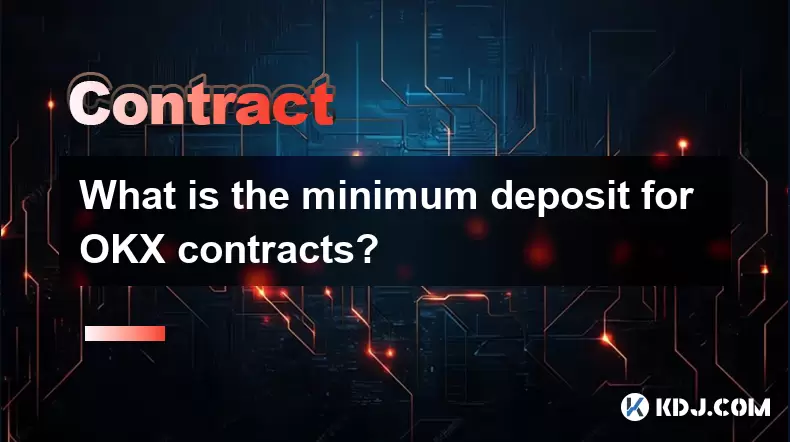
What is the minimum deposit for OKX contracts?
Aug 08,2025 at 07:00am
Understanding OKX Contract Trading BasicsOKX is one of the leading cryptocurrency derivatives exchanges, offering a wide range of perpetual and future...
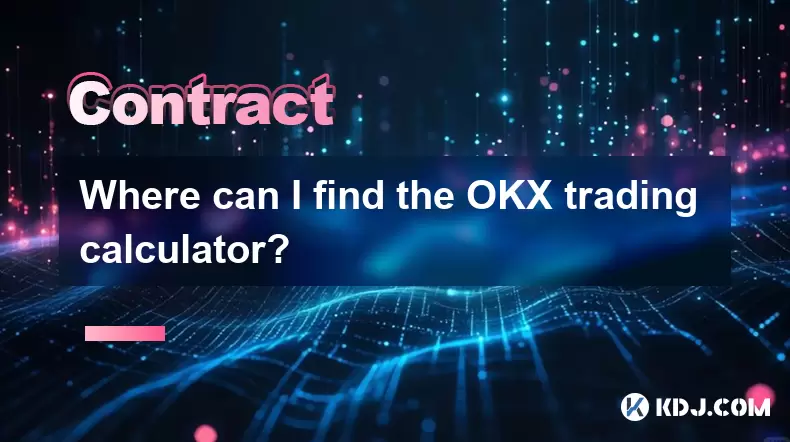
Where can I find the OKX trading calculator?
Aug 08,2025 at 07:49am
Understanding the OKX Trading Calculator FunctionalityThe OKX trading calculator is a powerful analytical tool designed to assist traders in estimatin...
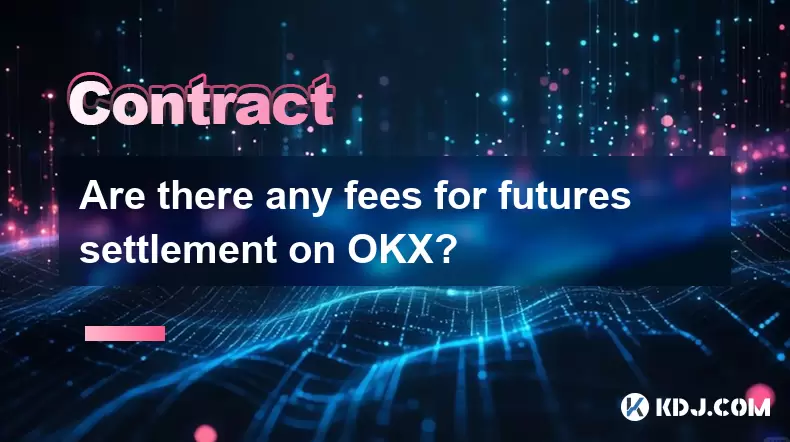
Are there any fees for futures settlement on OKX?
Aug 08,2025 at 05:35am
Understanding Futures Settlement on OKXFutures settlement on OKX refers to the process by which open futures contracts are automatically closed or mar...
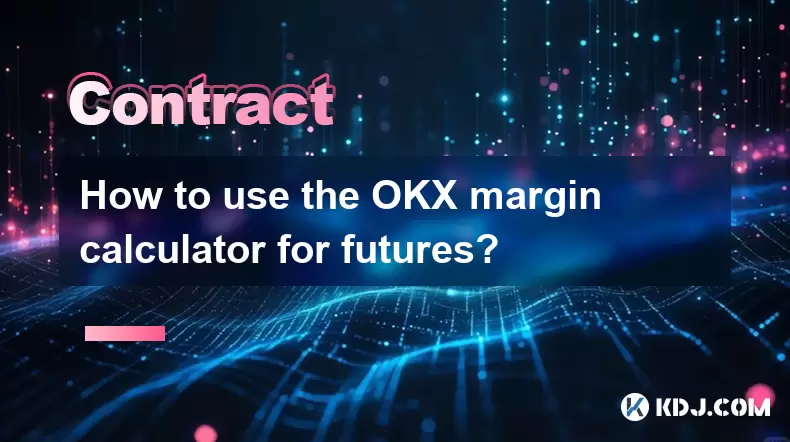
How to use the OKX margin calculator for futures?
Aug 08,2025 at 05:15am
Understanding the OKX Margin Calculator for FuturesThe OKX margin calculator is a specialized tool designed to assist traders in estimating the requir...
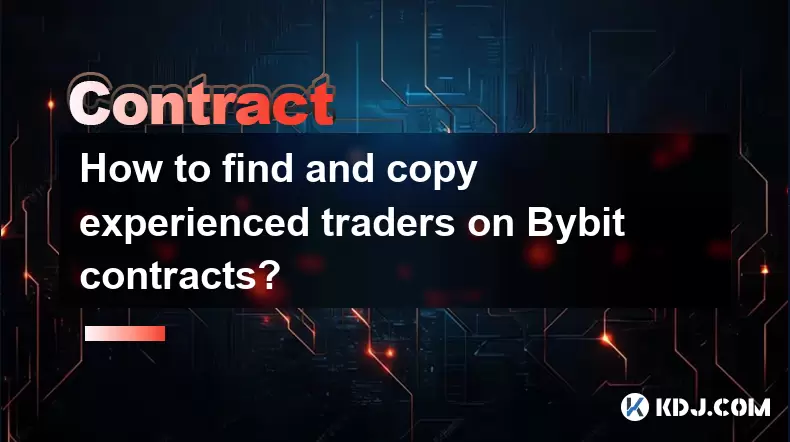
How to find and copy experienced traders on Bybit contracts?
Aug 08,2025 at 06:00am
Understanding Copy Trading on BybitBybit offers a copy trading feature that allows users to automatically replicate the contract positions of experien...
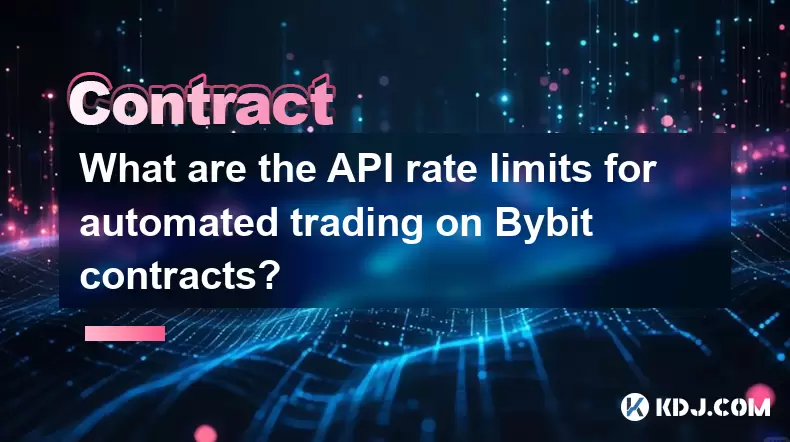
What are the API rate limits for automated trading on Bybit contracts?
Aug 08,2025 at 06:08am
Understanding API Rate Limits on BybitWhen engaging in automated trading on Bybit contracts, understanding the API rate limits is essential to prevent...

What is the minimum deposit for OKX contracts?
Aug 08,2025 at 07:00am
Understanding OKX Contract Trading BasicsOKX is one of the leading cryptocurrency derivatives exchanges, offering a wide range of perpetual and future...

Where can I find the OKX trading calculator?
Aug 08,2025 at 07:49am
Understanding the OKX Trading Calculator FunctionalityThe OKX trading calculator is a powerful analytical tool designed to assist traders in estimatin...

Are there any fees for futures settlement on OKX?
Aug 08,2025 at 05:35am
Understanding Futures Settlement on OKXFutures settlement on OKX refers to the process by which open futures contracts are automatically closed or mar...

How to use the OKX margin calculator for futures?
Aug 08,2025 at 05:15am
Understanding the OKX Margin Calculator for FuturesThe OKX margin calculator is a specialized tool designed to assist traders in estimating the requir...

How to find and copy experienced traders on Bybit contracts?
Aug 08,2025 at 06:00am
Understanding Copy Trading on BybitBybit offers a copy trading feature that allows users to automatically replicate the contract positions of experien...

What are the API rate limits for automated trading on Bybit contracts?
Aug 08,2025 at 06:08am
Understanding API Rate Limits on BybitWhen engaging in automated trading on Bybit contracts, understanding the API rate limits is essential to prevent...
See all articles

























































































